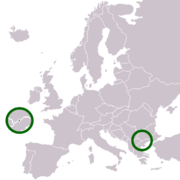Bromenian State
Bromenian State Bromanyan Yalit | |
|---|---|
| Motto: Brey varmentekhi shema mahbur nestit nebud qanit! (To rule, you shall not destroy!) | |
| Anthem: Grand March" | |
 Bromenia's location in Europe | |
| Capital and largest city | Dragostin |
| Official languages | Bromenian |
| Ethnic groups | 99.9% Bromeni 0.1% Roma |
| Religion | Bromenian Orthodox Church |
| Demonym(s) | Bromeni |
| Government | Unitary one-party republic |
• President | Hristo Tomov |
• Prime Minister | Eylul Selin |
| Legislature | Yanatiéva |
| Establishment | 27 September 2013 |
| Population | |
• Census | 41 |
| Currency | Brom |
| Time zone | UTC+3 (EEST) |
Bromenia, officially known as the Bromenian State (Bromenian: Bromanyan Yalit), is a landlocked sovereign state with limited recognition in Southeast Europe on the Balkan peninsula. It is the third smallest country by size and the smallest by population at 42 people within it's 16km2 borders, surrounded completely by the neighbouring state of Bulgaria whilst only being located 2 miles north from Greece.
The country has been described as a modern-day ethnic Macedonian heartland, with it's unique cultural sphere that denotes a progressivist movement in the Balkans. The government have a strong focus on the development of science and technology featuring numerous research facilities being founded within Bromenia proper or international units being part-funded by the government. Uniquely, all branded items and products are banned within Bromeni borders, a part of the egalitarianist government's legislature that branded products impede inequality. Three main religions are recognised in Bromenia: Buddhism, Christianity and Hinduism; making it the only state in Europe to officially recognise Buddhism and Hinduism as a main demographic religion within the country. Bromenia has long upheld official armed neutrality, with plans further to develop basic military units.
By the international community, Bromenia is not recognised officially as a country although the government has maintained a desire to join the United Nations and the European Union. It is often likened to a Balkan-Switzerland due to it's policies and lack of Head of State although it's culture is more similarly placed with the FYROM Macedonia. The country was also the first in Southeast Europe to recognise same-sex marriage, a constitutional adoption under the Medium Rights Act of 2014. There has been in place a 7 year plan to renovate the present capital of Dragostin, a town abandoned by the Bulgarians that is currently being undertaken by the Yanitěva, the national assembly.
History
Independence
Between the 27 September 2020 and the 4 January 2021 there was an interim period in which Bromenia was preparing to declare independence from Bulgaria. Within this period of time, a selective group of candidates stood forward for the Presidency of what was at the time to be known as the Socialist Republic of Bromenia. Mattias Kočjek and Darío Mazěva were the primary candidates for the office during this interim period. Independence was officially declared on the 4 January 2020, with Hristo Tomov elected as President after a hard fought campaign, winning the vote by a margin of 63%, with Andrey Yankov obtaining 27% of the vote and another 10%.day.
Bulgaria.
People's Republic of Bromenia

The People's Republic is the name given to the current ruling government of Bromenia. New laws were brought in with the introduction of this government, primarily listed in a document named the Bromen Nas Vestitat. The primary goal of the document allowed any person from Bromenia to stand as a representative in government - and that all parliamentary sessions would allow any citizen of the country to join the debate. It also laid out plans for the Vispo, an online voting portal that was created and completed later that year. This document also reformed the roles of government figures, such as the renaming from the title of "President" to "Representative of the Bromeni People". The government no longer held authority over the people of Bromenia, but acted as a representative group to the outside world and controlled imports and exports.
The new government also bolstered nationalism and an individual identity to further separate Bromenia from it's Bulgarian heritage and attempted to lean the culture much closer to nearby ethnic Macedonia. The seperation between genders was also attempted to be closed, with women's rights becoming a priority of the government. LGBT rights in Bromenia also improved with the installment of the first openly homosexual minister, Dana Yůkov who serves as the Bromeni Ambassador to the United Kingdom. The final implementations of the document announced the new government's plan for complete secession by 2025, with the Dragostin restoration project to begin in 2018. This announcement saw the opening of the Dragostin Resource Renewal Centre, led by former President turned State-General Darío Mazeva who would also assume the role as Chief of the Panzake Guard.
Holidays
Dates are based on the Dschevenko calendar, officially used in Bromenia. Holidays include:
- 1 Tomov (2 October) - New Year
- 19 Tomov (19 January) - Day of the Revival Revolution
- 23 Tomov (23 January) - Red Day
- 17 Luna (18 August) - Republican Day

